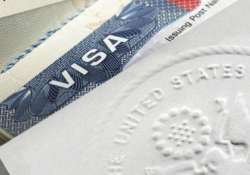In a move that could come as a warning bell for Indian tech companies operating in the US, California Congressman Zoe Lofgren today introduced a new bill in the House of Representatives that seeks doubling the minimum wage of H-1B Visa holders to USD 1,30,000 from current USD 60,000.
The move is likely to make it difficult for IT firms to use the H1B programme to replace American employees with foreign workers, including those from India.
The introduction of the bill, titled ‘High-Skilled Integrity and Fairness Act of 2017’, coincides with reports of President Donald Trump looking to sign a new executive order that aims strangulating work-visa programmes, including the H1B and L1.
The proposal in new bill is more than double of the current H-1B minimum wage of USD 60,000 which was established in 1989 and since then has remained unchanged.
“My legislation refocuses the H-1B programme to its original intent — to seek out and find the best and brightest from around the world, and to supplement the US workforce with talented, highly-paid, and highly-skilled workers who help create jobs here in America, not replace them,” Lofgren said.
“It offers a market-based solution that gives priority to those companies willing to pay the most. This ensures American employers have access to the talent they need, while removing incentives for companies to undercut American wages and outsource jobs,” he added.
Lofgren said that it removes the ‘per country’ cap for employment based immigrant visas so that all workers are treated more fairly and to move to a system where employers hire the most skilled workers without regard to national origin.
It raises the salary level at which H-1B dependent employer are exempt from attestation requirements to a new required wage level of 35 percentile points above the median national annual wage for Computer and Mathematical Occupations published by the Department of Labour Occupational Employment Statistics (roughly USD132,000), which would be adjusted in the future without the need for new legislation, and eliminates the Master’s Degree exemption for dependent employers.
The legislation sets aside 20 per cent of the annually allocated H-1B visas for small and start-up employers (50 or fewer employers) to ensure small businesses have an opportunity to compete for high-skilled workers, while still protecting against outsourcing.
It, among other things, removes visa hurdles for students and other temporary visa holders by building a bridge from F-1 student status to Lawful Permanent Residence and removes paperwork burdens by streamlining H-1B filing requirements and reducing administrative costs.
The legislation tightens employee protection by stipulating that employers may not reduce beneficiary wages, regardless of whether the deduction is in accordance with a voluntary authorisation by the employee.
It makes exceptions for taxes, garnishments, and deductions that are reasonable and customary in the occupation.
In related development, Senator Sherrod Brown has announced to introduce H-1B and L-1 Visa Reform Act in the Senate which he said would close loopholes in the H-1B and L-1 visa programs and provide increased protections for both American workers and visa holders.
“We need to crack down on the fraud and abuse that allows corporations to avoid paying Americans fair wages and exploit foreign workers,” Brown said.
“During his campaign, President Trump promised to increase oversight of our H-1B and L-1 visa programs and reform starts with this bipartisan legislation to ensure that American businesses are giving American workers a fair shot at good-paying jobs,” he said.
The bill would require that employers first offer a vacant position to an equally or better qualified American worker before seeking an H-1B or L-1 visa holder.
It would also establish wage requirements for L-1 workers and improve H-1B wage requirements to encourage companies to hire qualified American workers and prevent them from using foreign workers as a source of cheap labour.
Under the H-1B and L-1 Visa Reform, the Department of Labor (DOL) and the Department of Homeland Security (DHS) would have additional oversight authority to investigate fraud and abuse as well as to increase penalties for companies that violate the bill’s requirements.
The bill also requires DOL and DHS to share information so that visa petitions are effectively scrutinised.
Latest World News
